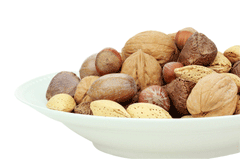What supplements will help prevent memory loss?

Mom died in her 80's but she "left us" when she was in her 70's as her Alzheimer's took over a once incredibly talented and bright mind. It's a horrible thing to watch and the Alzheimer's Association estimates that 4 million people have Alzheimer's disease just in the United States. That's a lot of people and then of course the family members become an important part of that equation first, of course, because of their loss, and secondly because they begin to worry about their own brain health. Which is why I have dedicated a lot of my time doing research on how to maintain a healthy brain and prevent dementia. Dementia is not always Alzheimers. Alzheimer's disease is, however, the most common cause of dementia in older people. If you visit my Facebook page, you will see this picture of me and Mom many years ago. I wonder if we couldn't have been able to help her knowing what we do today about brain health.

What is dementia?
As we age, we become more and more aware of some loss of brain function and your doctor will often tell you "you ARE getting older you know", which if you're like me makes you extremely frustrated and you'd like to hit him/her over the head with your chart. But dementia is basically a definite measurable decline in intellectual functioning which can interfere with activities of daily living and family relationships - and, of course, social situations. I still remember one time when my sister and I took Mom to lunch and she had a very difficult time trying to read the menu and order. She was still at the stage where she realized something wasn't right and it broke my heart to see her embarrassed about her inability to do so. I'm sure it was very scary to her as well. Dementia can be caused by Alzheimer's as mentioned, but it is also often caused by strokes which may be a series of strokes or only one that does the damage. A stroke is when the blood supply is blocked to your brain due to a blood clot - the same thing that causes a heart attack, except the clot is supplying blood to the brain rather than the heart. There are other reasons for dementia, but these are the two most common.
What can I do to prevent dementia?
When I was in nursing school, it was believed that brain cells could not be regenerated and once you lost them, they were gone forever. Research has shown this is not true and brain cells can be regenerated - good news for all of us! Researchers at Princeton University discovered that the formation of new nerve cells, a process called neurogenesis disproves that out-dated belief. I don't know about you, but when I first heard that, I was very, very relieved as the potential for developing Alzheimer's can be hereditary.
So now that we KNOW we can actually do something about those dying brain cells, shouldn't we be doing everything we can to make that happen? You will find past articles in our blog (see here) concerning brain health and we will be constantly informing you of new research as well as ways to increase your brain function.
The latest research that is interesting and reveals to us an easy fix is as simple as supplementing our diets with vitamin B12 and Folic Acid. This study showed that when people between the ages of 60 to 74 were given daily amounts of vitamin B-12 and Folic Acid, there was significant improvement in short and long-term memory. The improvement was documented after 2 years of supplementation, but why wait until you're 60 to start! In this study patients were given daily doses of Folic Acid (800 mcg), vitamin B-12 (500 mcg), and vitamin B-6 (20 mg).(1)
Cognitive benefits were also seen in a study that used smaller daily doses of just two of these vitamins: folic acid (400 mcg) and B-12 (100 mcg).This particular study showed that long-term supplementation of these vitamins at these dosages did "promote improvement in cognitive functioning after 24 months."
And yet another study showed additional nutrients that were effective for enhanced brain cognition. This study done with an elderly population (mean age of 87) showed that when blood levels were examined for each participant, those with higher levels of vitamins B (B1, B2, B6, folate, and B12), C, D, and E, as well as high in "marine" Omega 3 fatty acids, closely correlated with better brain functioning and increased brain volume. However, this study also showed that those participants with higher levels of trans fats (can you say hydrogenated oils?) had a lower cognitive function and lower brain volume. (3)
This should be enough to convince you to throw out those tubs of margarine and stop buying so many boxes of processed foods! What this also shows I believe is that it is obvious that what we eat or don't eat has a direct and measurable affect on the health of our brain and our future. I can't think of a better reason to change to a healthier diet. There is a lot of debate that taking supplements just produces expensive urine. I think these studies prove them wrong.
Thanks for listening!

(1) Celeste, A, Oulhaj,
A., Jacoby, R., Refsum, H., & Smith, A. D. (21 July 2011, 10.1212/WNL.0b013e3182436598). Cognitive and clinical outcomes of homocysteine-lowering
B-vitamin treatment in mild cognitive impairment: A randomized controlled
trial. International Journal of Geriatric Psychiatry
(2) Walker, Janine, et
al. (2012, January). Oral folic acid and vitamin B-12 supplementation to prevent cognitive
decline in community-dwelling older adults with depressive symptoms—the Beyond
Ageing Project: a randomized controlled trial. The American Journal of
Clinical Nutrition 95.1 (2012): 194-203.
(3)Bowman,
G. L. e., Silbert, L.C., Howieson, D. (Published online before print
December 28, 2011,). Nutrient biomarker patterns, cognitive function, and MRI
measures of brain aging. Neurology.

























